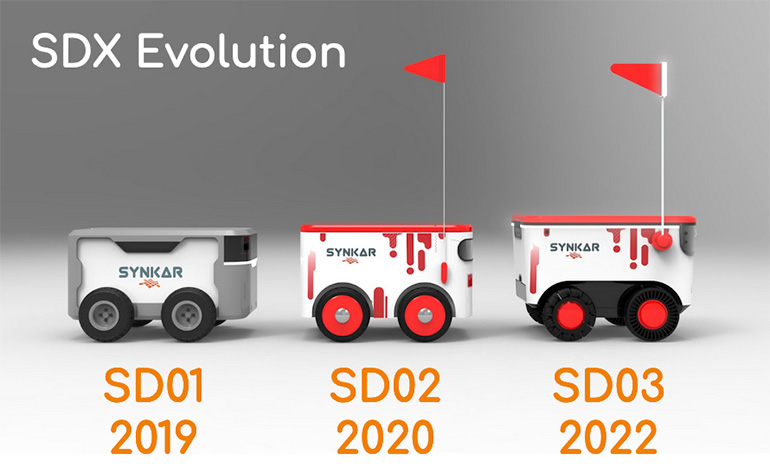|
Listen to this article  |

Synkar develops a robots-as-a-service sidewalk delivery solution. | Credit: Synkar
Synkar was started by three Brazilian engineers in Toronto Canada in 2019. Matheus Theodoro, Evandro Barros and Lucas Assis started the company with the idea to create a unique indoor/outdoor mobile robot. Now the company has offices in both Toronto and Brazil.
The first iteration of the Synkar autonomous delivery robot was designated SD01 (Synkar Delivery 01). The current version is SD02, and the company is working on the release of SD03 by the end of 2022.

The Synkar product family is evolving as the market demands additional features. | Credit: Synkar
Following the development of the robot, the company has built a B2B cloud based platform called SARA. The platform features a rich API that enables business partners to integrate quickly and manage the robot operations.
The company intends to offer the delivery service as a Robots-as-a-Service (RaaS) based solution. As such, the company has a roadmap to continue developing SARA and add features as necessary to support future use cases.
First mile food delivery
One of the early use cases for the Synkar mobile robot is food delivery, however, during the pandemic an interesting application for the Synkar mobile robot emerged: not in last mile delivery, but rather what might be called “first mile” delivery. The company worked with an online food delivery service app in Brazil to enable mall-based food court (inner mall) vendors to move customers orders from the food court, through the mall, out to the curbside, where human delivery drivers could easily take the orders out of the robots and then drive to the final delivery location.
This immediately improved the efficiency of the delivery drivers and shaved 6-8 minutes off the delivery cycle, as drivers didn’t need to find a place to park and then go into the mall to pick up a delivery order. It also provided an additional revenue stream for the mall-based restaurants, in a time when mall attendance was down. A win-win all around.
In fact the company envisions an operating model in which the delivery robots could fulfill orders for multiple online food delivery apps and restaurants at the same time, rather than simply partnering with a single ordering app solution. The company calls this a “shared fleet as a service” business model. One might also imagine food delivery in one order, followed by a parcel delivery a short time later.
The company is already working with several partners to create a reconfigurable cargo carrying container that will enable multiple, locked sections. However, the company states that even with a single order delivery container, customers don’t take other customers’ orders, except by mistake.
Within Brazil, the company is already working with the Brazilian Post service on parcel delivery.
The company has it’s R&D headquarters and manufacturing in Brazil, and a small team in Canada. This is primarily a result of the impact of the pandemic. In the future, the company plans to outsource manufacturing to other worldwide partners and expand its sales and support teams into other regions as it signs new partnerships and customers.
On the topic of sidewalk regulations and the future for sidewalk robots in cities such as Toronto, where sidewalk robots are currently banned, I talked to co-founder Lucas Assis at length about the issues facing these robotics solutions. Lucas believes that the Toronto city council is being cautious about the deployment of robots on sidewalks and is looking to define the requirements for public safety and safe operations before they allow the robots back onto the sidewalks.
In addition to opportunities in the Canada and Brazil, the company is also looking to expand in Ireland as new partnerships develop and opportunities emerge. Following that, the company plans to expand in to the United States and Portugal.
The company is currently raising a second round of investment of $4M to fund the expansion of the company and build a new fleet of robots for deployment.
Credit: Source link


Comments are closed.